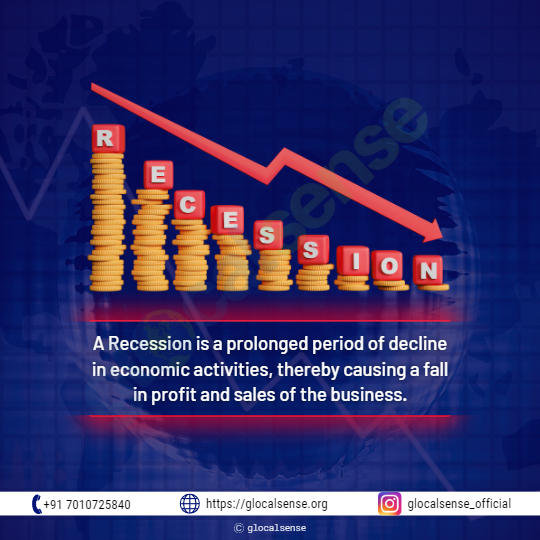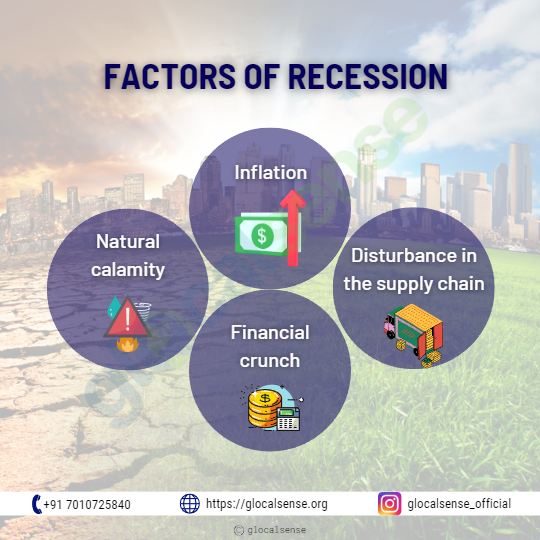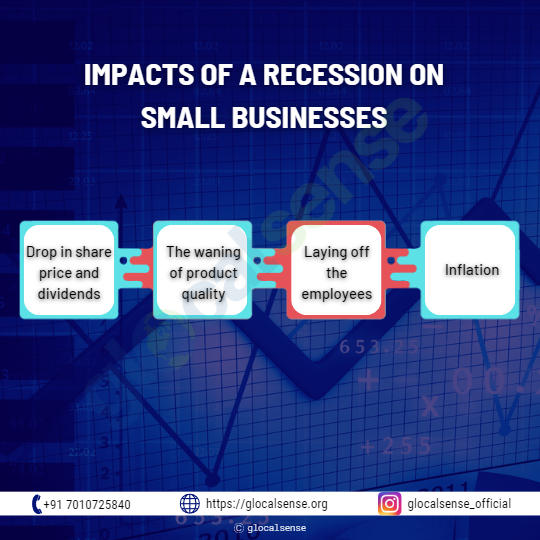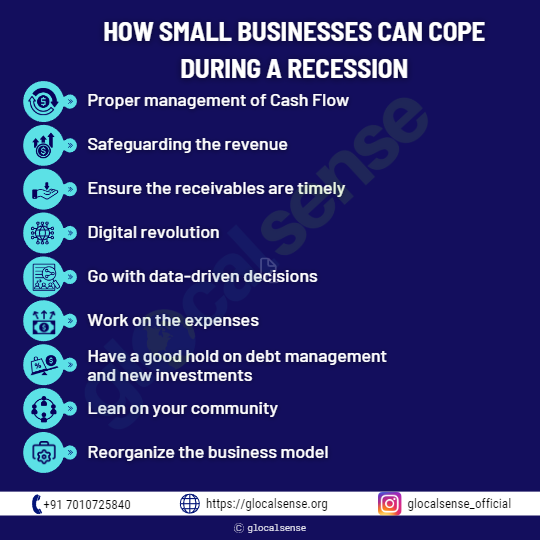According to a new study by the World Bank, the increase in rates by central banks across the world to reduce inflation will have an emerging recession in 2023. This recession is expected to be much worse than the 2008 financial recession. Therefore, now is the time for small and medium businesses to know the importance of managing difficult times during this upcoming recession.

Recession
A Recession is a prolonged period of decline in economic activities, thereby causing a fall in profit and sales of the business. Generally, a negative gross domestic product (GDP) for two consecutive quarters is considered a recession. Also, there are various complex methods and factors to manipulate the recession. Global recession involves synchronized recession in more than one country due to international financial systems and trade relations. Recession is generally caused due to various factors like inflation, disturbance in the supply chain, financial crunch, natural calamity, etc. Some indicators of recessions are unemployment, a fall in consumer spending power, a decline in income, and a slowdown in manufacturing. The intensity and duration of a recession have always been difficult to anticipate.

Predictions on Global recession in 2023
There is a drastic slump in global economic activities attributed to the COVID -19 pandemic, Russia’s invasion of Ukraine, the cost-of-living crisis in the UK, and financial tightening conditions. According to The World Bank: Global Growth to Slow through 2023, Adding to Risk of ‘Hard Landing’ in Developing Economies report, Global GDP is predicted to slow significantly from 5.5 percent in 2021 to 4.1 percent in 2022 and 3.2 percent in 2023 as pent-up demand dissipates and fiscal and monetary support is removed globally. Growth in advanced countries is predicted to slow from 5% in 2021 to 3.8 percent in 2022 and 2.3 percent in 2023—a rate that, while slowing, will be adequate to return production and investment to pre-pandemic levels in these economies. However, growth in emerging and developing economies is predicted to fall from 6.3 percent in 2021 to 4.6 percent in 2022 and 4.4 percent in 2023.

How recession impacts small businesses around the world
The work nature of small and medium businesses is different compared to large enterprises. Therefore, recession affects them differently. Small businesses generally won’t have revenue stream diversification to help them withstand the recession. They rely more on monthly cash flow than quarterly and annual budget plans. Hence, they feel that recession hits them faster than large companies. In countries like the US, around three-quarters of jobs are created by small-scale businesses acting as a major economic drivers. Some businesses engage in cost-cutting measures and wait for growth. The following are some of the impacts of a recession on small businesses.

- Drop in share price and dividends: First major impact of the recession on business is cash flow. The profits and cash flow will reduce and make their way to financial statements, reducing the share price and dividends. In some cases, dividends even disappear. Shareholders may choose new leaders due to a drop in share price.
- The waning of product quality: Another major impact of the recession on business is the waning of product quality. As a cost measure, the company might compromise on service or product quality as the unpaid bill increases and slackens manufacturing.
- Laying off the employees: For small and medium-scale businesses, cost cuts mainly involve downsizing employees during a recession.
- Inflation: Price directly impacts purchasing power of the business during inflation. During inflation, the interest rates get an increase, furthering the recession.
Challenges that most of the advanced economic countries are facing due to recession:
For the first time in many years, the inflation rates have increased more than expected in the United States and major economic parts of Europe, creating stiff financial conditions. Also, the renewed Covid outbreak and lockdowns have suppressed China’s progress in growth, and also this has caused a bottleneck in the global supply chain. War in Ukraine has led to the stop of gas flow from Russia to Europe. In addition, there is Social Unrest and insecurity about food and fuel, which in turn causes increased food and energy price. As a result, the economy downgrades for net importers like the Middle East, Asia, Africa, and Europe. Policy designers will focus on maintaining critical spending and laying the foundations for stable growth.

How small businesses can cope during a recession
There is no way one can prevent recession completely, but one can have control over one’s own business. Recession generally brings hurdles in business, especially in the case of small-scale businesses. But small actions can have a greater impact in reforming the company by creating the capacity to recover quickly from difficulties. Also, small businesses have strong customer relationships, making a strong fan base loyal to the company. As a result, every small business can survive and prosper potentially during economic uncertainties. Moreover, a recession allows businesses to find innovative ways to slash costs and protect interest.
Proper management of Cash Flow: Cash flow should be appropriately monitored to avoid tight cash. Normally tight cash will occur when the expenses are higher and revenue is less than normal. To maintain the proper cash flow, monitor the cash flow daily and extrapolate the data to 6 months or a year to foresee the cash flow in the form of charts. Such charts can help you effectively strategize to prevent cash crunch situations.

Predict the cash flow by anyone of the following methods:
- Direct method: Direct method concentrates on short-term business, like immediate financial requirements. This method focuses on cash inflow and outflow by monitoring payments and receipts.
- In-Direct method: Indirect method typically concentrates on the business’s long-term goals involving tracking past cash flows using income statements of previous years, liquidity, capital investments, and movements to extrapolate the cash flow for the future. In addition, it develops worst- and best-case scenario budgets to better plan unpredicted challenges. Study and analyze how the previous recession affected the business in your industry, enabling you to prepare a better plan for your cash reserve.
Plan accordingly for the recession and also have the following emergency funds:
- “Rainy Day Funds”: These funds are the cash reserves for unexpected, minimal expenses. They differ from emergency cash reserves by the amount and usage purpose.
- An extra line of credit: It is an agreement between the customer and the bank to draw an extra amount for a particular limit for a defined period. Increasing this limit by raising the credit score helps during the cash crunch period.
- Emergency Investors: Nowadays, whenever there is a cash crunch during the recession, it is always better to have emergency investors. Generally, these investors adopt different financial instruments to manipulate their rate of return. Hence it is always better to maintain good financial statements and index factors to get more investors easily.
Safeguarding the revenue: Unit economics studies the company’s cost-to-revenue ratio to the basic unit. Then, identify the strongest revenue channels using unit economics and protect those revenues and profits they yield. This method involves business model modification, pricing structure optimization, and cutting services or products that do not yield profit. Then, during a recession, stop reinvesting the profits into the business.
Ensure the receivables are timely: During a recession, the customers will pay slowly due to tight cash. Start evaluating customers based on their payment habits. Stop working with customers who don’t pay on time and don’t extend credit when the company cash flow can’t withstand it.
Digital revolution: Start upskilling workers for the digital economy and utilizing innovations like crypto assets and regulatory framework. As the future is digital, it becomes important to bring new sources, employment, and growth.
Go with data-driven decisions: It is always better to make decisions based on the company’s financial numbers instead of following randomly with an instinct to avoid any major failures in business.
Work on the expenses: With inflation in place, the cost will increase appropriately during the recession. Start implementing things to reduce the extra expense, strengthen the cash reserve, and enter the recession with better operating procedures that are mean, lean, and effective. The most common expenses are travel, lunch, company retreats, and extra office supplies. Try to slash these expenses during a recession. After the COVID pandemic, businesses worldwide have learned to operate remotely without office spaces to save on utilities and rent expenses.
Have a good hold on debt management and new investments: During odd times, paying off debts becomes difficult. It can even eat away the cash reserve and completely downtrodden cash flow. Better pay off higher interest rates and principles during the recession. Assess your costs incurred and payments carefully before buying any new debt.
Lean on your community: It is always better to stick to your community. In that way, local businesses and customers can help keep the door open for them. The following are the ways to lean on your community to help small businesses.
- Customers know how to support the business and provide the money, energy, and time needed.
- This move increases the reputation of the company.
- Help other local businesses during the recession.
Reorganize the business model: If the current business model won’t work well in the recession, it is better to pivot it to survive. Pivot is defined as reorganizing a business’s operating model to adapt to market needs changes. Business generally pivots in one or more of the following ways:
- Sell new and recession-resistant products.
- Modify the organizational structure.
- Rebranding.
- Redefines the rules of business.
For instance, during the Covid-19 pandemic, many restaurants have switched their traditional “sit-down” business model to take away only. This pivot model helped them to cut operating expenses and cushion them during the economic downturn. Small businesses have yet to try pivoting into entirely new segments or products. For example, Misadventure & Company Distillery started making hand sanitizer to support vodka sales. It is always better to stay ready for a recession instead of waiting for its happening. This way, we can resist the recession and stay in the market.
